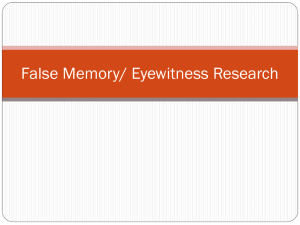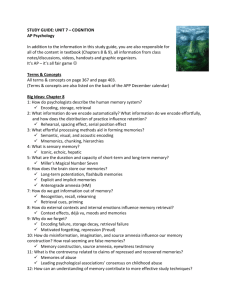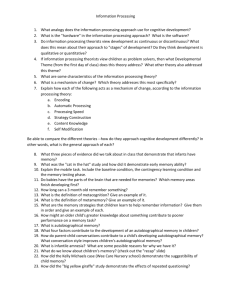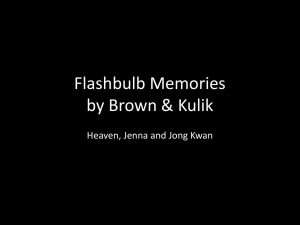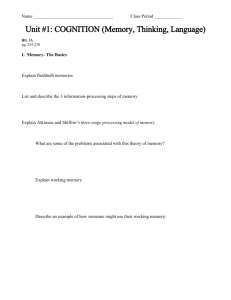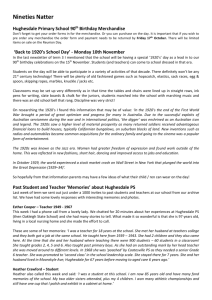Spotlight on Terminology and Language – ESL Pointers
advertisement
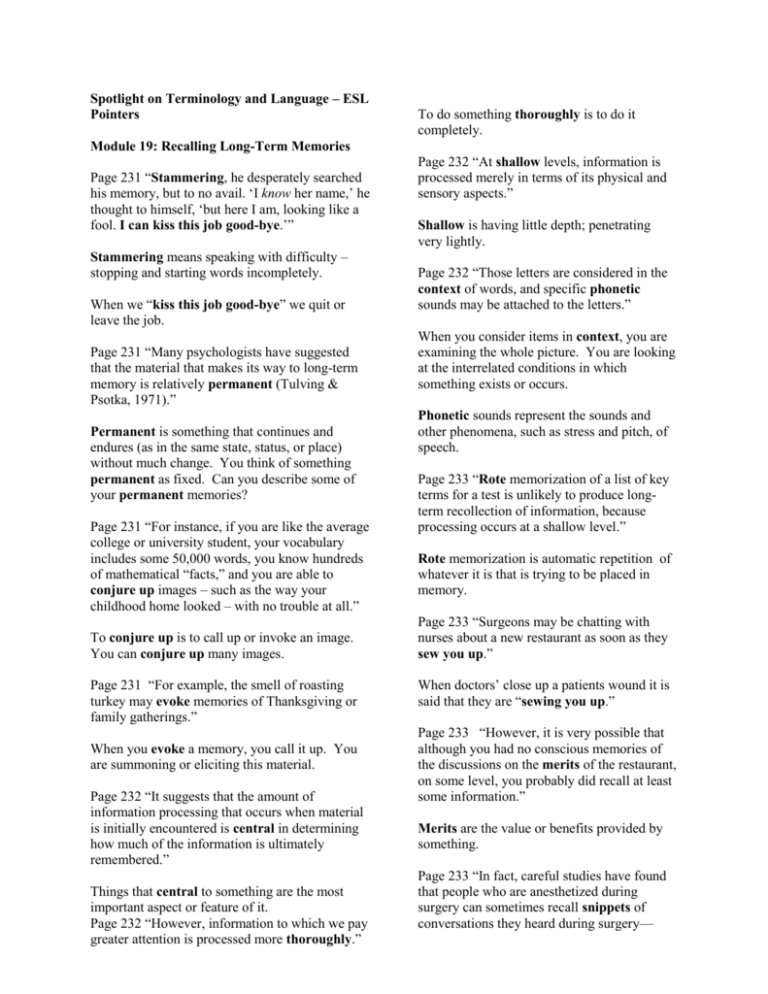
Spotlight on Terminology and Language – ESL Pointers To do something thoroughly is to do it completely. Module 19: Recalling Long-Term Memories Page 231 “Stammering, he desperately searched his memory, but to no avail. ‘I know her name,’ he thought to himself, ‘but here I am, looking like a fool. I can kiss this job good-bye.’” Stammering means speaking with difficulty – stopping and starting words incompletely. When we “kiss this job good-bye” we quit or leave the job. Page 231 “Many psychologists have suggested that the material that makes its way to long-term memory is relatively permanent (Tulving & Psotka, 1971).” Permanent is something that continues and endures (as in the same state, status, or place) without much change. You think of something permanent as fixed. Can you describe some of your permanent memories? Page 231 “For instance, if you are like the average college or university student, your vocabulary includes some 50,000 words, you know hundreds of mathematical “facts,” and you are able to conjure up images – such as the way your childhood home looked – with no trouble at all.” To conjure up is to call up or invoke an image. You can conjure up many images. Page 231 “For example, the smell of roasting turkey may evoke memories of Thanksgiving or family gatherings.” When you evoke a memory, you call it up. You are summoning or eliciting this material. Page 232 “It suggests that the amount of information processing that occurs when material is initially encountered is central in determining how much of the information is ultimately remembered.” Things that central to something are the most important aspect or feature of it. Page 232 “However, information to which we pay greater attention is processed more thoroughly.” Page 232 “At shallow levels, information is processed merely in terms of its physical and sensory aspects.” Shallow is having little depth; penetrating very lightly. Page 232 “Those letters are considered in the context of words, and specific phonetic sounds may be attached to the letters.” When you consider items in context, you are examining the whole picture. You are looking at the interrelated conditions in which something exists or occurs. Phonetic sounds represent the sounds and other phenomena, such as stress and pitch, of speech. Page 233 “Rote memorization of a list of key terms for a test is unlikely to produce longterm recollection of information, because processing occurs at a shallow level.” Rote memorization is automatic repetition of whatever it is that is trying to be placed in memory. Page 233 “Surgeons may be chatting with nurses about a new restaurant as soon as they sew you up.” When doctors’ close up a patients wound it is said that they are “sewing you up.” Page 233 “However, it is very possible that although you had no conscious memories of the discussions on the merits of the restaurant, on some level, you probably did recall at least some information.” Merits are the value or benefits provided by something. Page 233 “In fact, careful studies have found that people who are anesthetized during surgery can sometimes recall snippets of conversations they heard during surgery— even though they have no conscious recollection of the information.” A snippet is a part of something that is incomplete by itself. Page 233 “Even though people may say and even believe they harbor no prejudice, assessment of their implicit memories may reveal that they have negative associations about members of minority groups.” When you harbor something you keep it in mind or believe it. Page 234 “You promptly forget the name of the moon, at least consciously.” To do something promptly is to do it immediately, or right a way. Page 234 “Then, several months later, you’re completing a crossword puzzle that you have partially filled in, and it includes the letters obos.” A crossword puzzle is a word problem where letters are placed in a grid according to clues, so that they form words from left to right and up to down on the grid. Page 234 “You will most likely draw a blank until this piece of information is added: January 12, 2010, was the date of the catastrophic earthquake in Haiti.” When people “draw a blank” they cannot remember something. Page 234 “Flashbulb memories illustrate a more general phenomenon about memory: Memories that are exceptional are more easily retrieved (although not necessarily accurately) than are those relating to events that are commonplace.” Things that are exceptional are unusual and stand out. Things that are commonplace are usual or ordinary. Page 235 “As we have seen, although it is clear that we can have detailed recollections of significant and distinctive events, it is difficult to gauge the accuracy of such memories.” To gauge something is to measure it. Page 235 “He suggested that people tend to remember information in terms of schemas, organized bodies of information stored in memory that bias the way new information is interpreted, stored, and recalled (Bartlett, 1932).” To bias something is to be unfair or prejudice in your decisions. Page 236 “One of the earliest demonstrations of schemas came from a classic study that involved a procedure similar to the children’s game of ‘telephone’, in which information from memory is passed sequentially from one person to another.” The game of telephone is a game in which a message is passed from one person to another in a whisper. The object is to see if the message started by the first person is the same message that the last person hears—usually the message changes as it gets passed from one person to the next. A sequence is one event following another in some order; sequentially means how this is done. Page 236 “The transformation of the white person’s razor into an African American’s knife clearly indicates that the participants held a schema that included the unwarranted prejudice that African Americans are more violent than Caucasians and thus more apt to be holding a knife.” Things that are unwarranted are not justified or deserved. Page 236 “Both were ultimately exonerated on the basis of DNA evidence.”” To be exonerated is to be found innocent of any wrongdoing. Page 236 “When a criminal perpetrator displays a gun or knife, it acts like a perceptual magnet, attracting the eyes of the witnesses.” A magnet is something, usually a piece of metal, which attracts things to it. Page 237 “Some were then asked the question, ‘About how fast were the cars going when they smashed into each other?’” To smash something is to hit it very hard, so that it breaks into pieces. Page 237 “Children’s memories are especially susceptible to influence when the situation is highly emotional or stressful.” When someone is susceptible they are vulnerable or at risk. Page 237 “For example, in trials in which there is significant pretrial publicity or in which alleged victims are questioned repeatedly, often by untrained interviewers, the memories of the alleged victims may be influenced by the types of questions they are asked (Scullin, Kanaya, & Ceci, 2002; Lamb & Garretson, 2003; Quas, Malloy, & Melinder, 2007; Goodman & Quas, 2008). ).” Alleged means suspected of wrongdoing, but there is not yet proof. Page 237 “The entire case was based on memories of Franklin’s daughter, who claimed that she had repressed them until she began to have flashbacks of the event two decades later.” To repress a memory is to block it out. A flashback is a very vivid and detailed memory of a painful event that happened in the person’s past. Page 238 “On the basis of her memories, her father was convicted—and later cleared of the crime after an appeal of the conviction.” An appeal is formal request for the court system to rethink another court’s decision. Page 238 “Supporters of the notion of repressed memory (based on Freud’s psychoanalytic theory) suggest that such memories may remain hidden, possibly throughout a person’s lifetime, unless they are triggered by some current circumstance, such as the probing that occurs during psychological therapy.” When we probe something we do a complete investigation into it. Page 238 “However, memory researcher Elizabeth Loftus maintains that so-called repressed memories may well be inaccurate or even wholly false—representing false memory.” Wholly means completely. Page 238“For example, we tend to forget information about our past that is incompatible with the way in which we currently see ourselves.” Something that is incompatible is mismatched or conflicting. Page 238 “One study found that adults who were well adjusted but who had been treated for emotional problems during the early years of their lives tended to forget important but troubling childhood events, such as being in foster care.” Foster care is a system in Canada in which children whose parents cannot provide care for them are placed with other families. Page 238 “For example, although 61 percent of the questionnaire respondents said that playing sports and other physical activities was their favorite pastime, only 23 percent of the adults recalled it accurately (Offer et al., 2000).” A pastime is a hobby or pleasurable activity. Page 239 “Travelers who have visited areas of the world in which there is no written language often have returned with tales of people with phenomenal memories.” Something that is phenomenal is very unique or extra special. Page 239 “For instance, storytellers in some preliterate cultures can recount long chronicles that recall the names and activities of people over many generations.” A preliterate culture is one that does not use the written word. Recount means to tell a story. Chronicles are a type of story that relates the history of a particular group of people. Page 239 “Those feats led experts to argue initially that people in preliterate societies develop a different, and perhaps better, type of memory than do those in cultures that employ a written language.” Feats are notable achievements. Page 239 “Basic memory processes such as shortterm memory capacity and the structure of longterm memory—the “hardware” of memory—are universal and operate similarly in people in all cultures.” Hardware refers to the tools and equipment that make up a computer. Page 240 “From a social worker’s perspective: Should a child victim of sexual abuse be allowed to testify in court, based on what you’ve learned about children’s memories under stress?” To testify means to tell a story and/or answer questions under oath in a legal proceeding.
